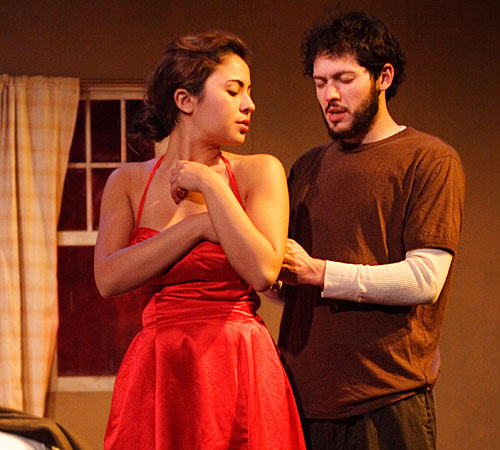Actors strip in sexual play

April 22, 2008
Most stage actors get into character by wearing a costume and putting on makeup. However, for some of the actors in the Armory Free Theatre’s production of “Red Light Winter” on Friday and Saturday nights, playing their role meant taking it all off instead of putting it on.
The play, written by Adam Rapp and directed by graduate student Justin Gordon, focuses on the consequences unhealthy friendships, sexual obsession and loneliness can bring, and contains full male and female nudity.
The Armory Free Theatre, which hosted the play, is known for its tolerance of experimental and edgy works.
“The (theatre) is the primary site for student driven productions of experimental theatre (and) original works … not otherwise accommodated by the university,” according to the artistic mission listed on its Web site.
Few restrictions are put on directors at the theatre.
Get The Daily Illini in your inbox!
For “Red Light Winter,” the only things not allowed were open flames from lighters and actual smoking, which is banned in all University buildings, Gordon said.
The productions hosted by the theatre are chosen each semester by a panel of students and faculty, and their themes vary by semester depending on which plays are submitted, Gordon said.
“Red Light Winter” falls into this edgy category, featuring the aforementioned nudity as well as prostitution and simulated sex.
“The play is written in a very real and gritty style,” Gordon said. “I think the full male and female frontal nudity is necessary considering the nature of the show.”
The curtain opens in Amsterdam, where two men in their early 30s who have known each other since college are staying together in a hostel. Matt, played by graduate student Anthony Bianco, is an aspiring playwright suffering from depression and a lack of romantic interests.
His roommate Davis, a stereotypical frat-boy character played by graduate student Drew Shirley, hires a prostitute to help pull Matt out of his slump.
The nudity comes during the scene where Bianco and Linda Yala, freshman in FAA, playing the prostitute Christina, have simulated sex.
“There’s something to be said for not just fading to black and letting the audience off the hook … the audience doesn’t have to face the issues and misses the transformation theatre can bring,” Bianco said.
The directors and actors agreed that the nudity contributed to the highly realistic feel of the play.
“This isn’t gratuitous nudity,” Gordon said. “It’s honest and real. This is what happens when people have sex.”
He said that the nudity expresses both the beauty and ugliness of sex itself.
Still, taking your clothes off in front of your audience is not necessarily easy, even if it is in the name of art.
“This is the first time I’ve ever done anything like this, so it’s not the easiest thing at first,” Bianco said.
Audience members agreed that the play would not have had the same message and level of realism had the nudity not been included.
“I think that the nudity in the play made the feelings and actions of the characters more real to the audience … I thought in the situation the characters were in, nudity was incredibly relevant,” said Annelise Morris, junior in LAS.
For Yala, baring it all in front of her friends presented a slight challenge.
“My friends were kind of anxious to see the play since they knew they were going to see me naked, but once they actually saw it, they were surprised at how it didn’t dominate the show,” Yala said.
The dramatic elements of the play worked to take the spotlight from the nudity quite easily. Matt develops an obsessive infatuation with Christina and cannot get over her.
Christina, on the other hand, comes back to find Davis in New York a year after they first met so she can confess she has fallen in love with him instead.
In the end, nobody leaves happy, as it becomes clear that none of the characters’ feelings are mutual.
“I really think this play shows how much of a complication sex can be in modern life,” Gordon said. “It can be a mutual act, but it often remains very separate.”






